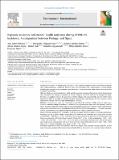| dc.description.abstract | Background: To control the spread of the SARS-CoV-2 virus, countries around the world implemented lockdowns with varying intensities. Lockdowns, however, have been associated with a deterioration of mental health, including post-traumatic stress symptoms, anger and anxiety. Exposure to nature might reduce stress and provide relaxation opportunities.
Objective: Firstly, we aimed to determine which sociodemographic, housing and lockdown-related characteristics were associated with changes in exposure to nature during the COVID-19 lockdown in Portugal and Spain. Secondly, we sought to estimate the associations of these changes with mental health, and test whether these associations differed according to sociodemographic characteristics and between the two countries, which experienced different restrictions and epidemiological situations.
Methods: A cross-sectional study was conducted between March 27 and May 6, 2020, using an online questionnaire to measure changes in exposure to nature (including private green space and other greenery, views of nature from home and public natural spaces); sociodemographic, housing and lockdown-related characteristics; stress levels (visual stress scale); psychological distress (General Health Questionnaire − 12 items) and somatization (somatization scale). Adjusted regression models were fitted to estimate associations.
Results: This study included 3157 participants (1638 from Portugal, 1519 from Spain). In Portugal, maintaining/increasing the use of public natural spaces during the lockdown was associated with lower levels of stress (adjusted beta −0.29; 95%CI −0.49, −0.08) and maintaining/increasing the frequency of viewing nature from home was associated with reduced psychological distress (0.27; −0.51, −0.03), somatization (−0.79; −1.39, −0.20), and stress levels (−0.48; −0.74, −0.23). In Spain, maintaining/increasing contact with private green space and greenery was associated with lower stress levels: for contact with indoor plants (−0.52; −0.96, −0.07) and for use of private community green spaces (−0.82; −1.61, −0.03).
Conclusion: Exposure to nature was associated with better mental health outcomes during lockdowns, but the natural features associated with improved mental health differed between the two countries. Nature should be incorporated into urban planning interventions and housing design and exposure to nature should be promoted during lockdowns. | en_US |
